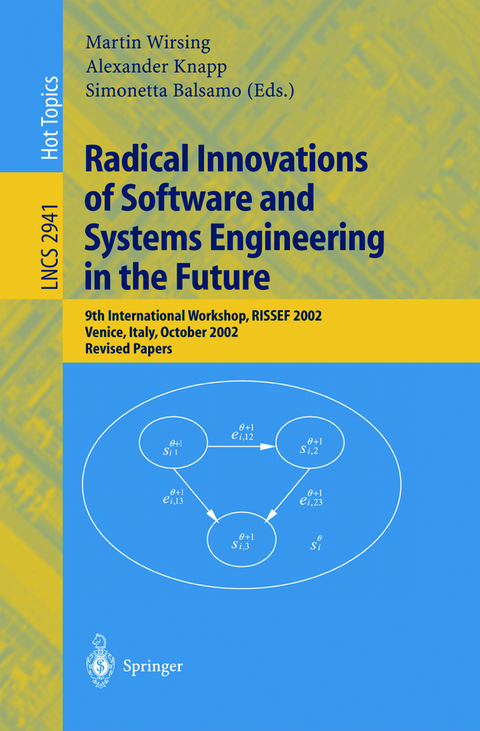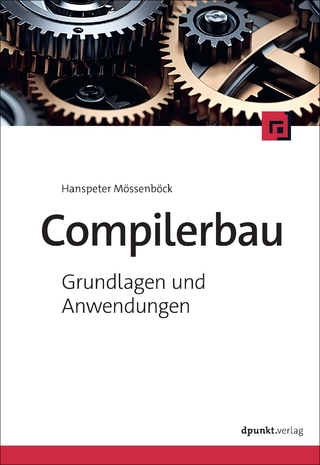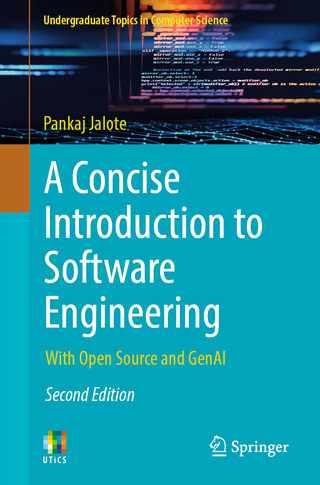
Radical Innovations of Software and Systems Engineering in the Future
Springer Berlin (Verlag)
978-3-540-21179-2 (ISBN)
Prof. Dr. Martin Wirsing ist Leiter des Lehrstuhls für Programmierung und Software-Technik des Instituts für Informatik der LMU München und Vizepräsident der LMU für den Bereich Studium.
Architecture Specific Models: Software Design on Abstract Platforms.- Tight Structuring for Precise UML-Based Requirement Specifications.- Integrating Performance Modeling in the Software Development Process.- The Inevitable Pain of Software Development: Why There Is No Silver Bullet.- Toward Component-Oriented Formal Software Development: An Algebraic Approach.- Higher Order Applicative XML Documents.- A New Paradigm for Requirements Specification and Analysis of System-of-Systems.- Towards Ontology Driven Software Design.- A Model Based Development Approach for Distributed Embedded Systems.- Pervasive Challenges for Software Components.- Model Generation for Legacy Systems.- Automatic Failures-Free Connector Synthesis: An Example.- Module Dependences in Software Design.- Towards Fully Automatic Execution Monitoring.- Automation of Software System Development Using Natural Language Processing and Two-Level Grammar.- A General Resource Framework for Real-Time Systems.- Architecture Based Model Driven Software and System Development for Real-Time Embedded Systems.- A Computational Model for Complex Systems of Embedded Systems.- Software Evolution as the Key to Productivity.- Model-Checking Complex Software - A Memory Perspective.- Agile Modeling with the UML.- Predictable Component Architectures Using Dependent Finite State Machines.- From Object Orientation to Goal Orientation: A Paradigm Shift for Requirements Engineering.- View Consistency in Software Development.
| Erscheint lt. Verlag | 18.3.2004 |
|---|---|
| Reihe/Serie | Lecture Notes in Computer Science |
| Zusatzinfo | IX, 359 p. |
| Verlagsort | Berlin |
| Sprache | englisch |
| Maße | 155 x 233 mm |
| Gewicht | 560 g |
| Themenwelt | Mathematik / Informatik ► Informatik ► Software Entwicklung |
| Informatik ► Theorie / Studium ► Compilerbau | |
| Schlagworte | component-oriented software devel • component-oriented software development • Design • Embedded Systems • Hardcover, Softcover / Informatik, EDV/Informatik • HC/Informatik, EDV/Informatik • Modeling • ontology driven software design • Processing • Productivity • Real-Time Systems • Requirements Engineering • Software Design • software development • Software engineering • Software Engineering / Softwareentwicklung • Softwareentwicklung • software evolution • Systemanalyse (EDV) • system development • Systems Analysis • Systems Design • Systems Engineering • systems modeling • UML • unified modeling language (UML) |
| ISBN-10 | 3-540-21179-9 / 3540211799 |
| ISBN-13 | 978-3-540-21179-2 / 9783540211792 |
| Zustand | Neuware |
| Informationen gemäß Produktsicherheitsverordnung (GPSR) | |
| Haben Sie eine Frage zum Produkt? |
aus dem Bereich


